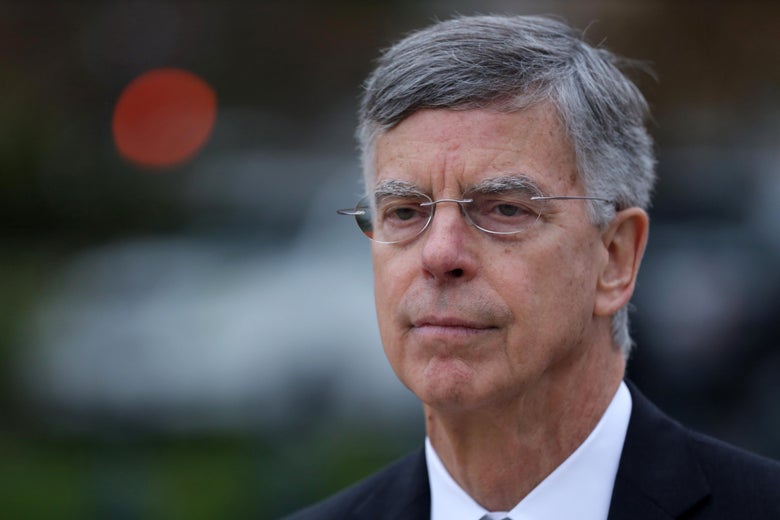
Bill Taylor at the Capitol on Tuesday.
Alex Wong/Getty Images
On Tuesday, the former ambassador to Ukraine testified behind closed doors as part of the House’s impeachment inquiry into President Donald Trump. His testimony, as people in the room recounted it to journalists, was dramatic: The opening statement (later obtained by the Washington Post) was described as “incredibly damaging to the president,” as raising “frozen” eyebrows, as eliciting “sighs and gasps,” as a “sea change,” and as one legislator’s “most disturbing day in Congress” yet.
Who is this man who caused such a stir? Here’s what you need to know about Bill Taylor.
He replaced an official ousted for allegedly resisting Trump’s demands for investigations.
Taylor has had a long career in government. A graduate of West Point, he served in Vietnam, where, according to Salon, he grew disillusioned with the Army and the corruption he saw in it. He went on to serve in various posts in the State Department. From 2006 to 2009, under Presidents George W. Bush and Barack Obama, Taylor served as ambassador to Ukraine. He then took a position with the United States Institute of Peace. He was called back to fill his old role temporarily after Marie Yovanovitch was ousted from her position as ambassador to Ukraine in May.
The decision to remove Yovanovitch has become a topic of inquiry for the House. According to the Wall Street Journal, Yovanovitch was forced out after a campaign by several Trump allies, who accused her of undermining his efforts in Ukraine and therefore of being disloyal. They also complained she had spoken negatively of the Trump administration and that she had been intervening in his efforts to have Ukraine investigate Biden. Yovanovitch later testified that Trump had pressured the State Department to recall her and that he had said her removal was a priority.
His texts are a major part of the impeachment inquiry.
On Sept. 1, in a text message made public earlier this month, Taylor voiced concerns to Gordon Sondland, U.S. ambassador to the European Union. “Are we now saying that security assistance and WH meeting are conditioned on investigations?” Taylor wrote. Sondland replied, “Call me.”
Eight days later, in a text to Sondland and Kurt Volker, who was then the U.S. special representative for Ukraine negotiations, Taylor again expressed frustration over the withheld aid for Ukraine. “The message to the Ukrainians (and Russians) we send with the decision on security assistance is key,” he wrote. “With the hold, we have already shaken their faith in us. Thus my nightmare scenario.”
He then said, “I think it’s crazy to withhold security assistance for help with a political campaign.” According to Sondland’s testimony last week, Sondland then spoke to the president to ask about a link between the aid and the investigation. He then replied to Taylor, saying he thought the ambassador was “incorrect about President Trump’s intentions” and that the “President has been crystal clear no quid pro quo’s of any kind.”
The day before, he had texted to warn against a proposal in which Ukrainian President Volodymyr Zelensky would promise in a media interview to commit to investigations Trump wanted. Taylor was still concerned about the withheld aid. “The nightmare is they give the interview and don’t get security assistance,” Taylor wrote. “The Russians love it. (And I quit.)”
His testimony was bad for Trump.
His testimony Tuesday came as a result of a House Intelligence Committee subpoena after the State Department attempted to block his appearance before the lawmakers. Just as he spoke out against the administration’s actions in his texts, Taylor pushed back against claims that the administration had acted according to standard diplomatic protocol. He told the lawmakers that Trump did, in fact, make the release of military aid to Ukraine contingent on its public avowal to investigate the Bidens and the unsubstantiated conspiracy theory that Ukraine and not Russia was behind the meddling in the 2016 election.
Taylor’s testimony was thorough and covered a number of interactions with various White House and Ukrainian officials, according to reports on his remarks. The administration’s effort was not a small one, he said, and Trump and his lawyer Rudy Giuliani seemed committed to something hard to describe as anything other than quid pro quo. The picture he painted was clear: Trump had used his office to try to help himself win reelection.